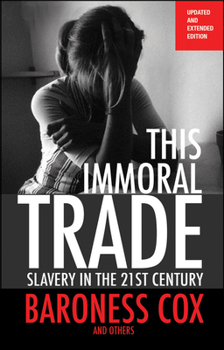This Immoral Trade: Slavery in the 21st Century: Updated and Extended Edition
Select Format
Select Condition 
Book Overview
Slavery remains rampant worldwide. At least 27 million men, women, and children are enslaved today, ranging from prostitutes in London to indentured workers in Burma. This book tells some of their stories. 'The statistics of modern day slavery are shocking, ' writes Baroness Cox. 'Behind each statistic is a human being - a man, woman, or child; and behind each human being is a family and a community which have been devastated or destroyed. As real-life experiences often speak louder than words, we introduce some of the hundreds of former slaves we have met personally.' The picture is changing rapidly: there are grounds for optimism, but also fresh concern. This popularly written but carefully researched volume has been fully updated for this new edition. It includes chapters on the causes of slavery, on the history of the practice, on different forms of contemporary slavery and truly shocking case studies from Sudan, Burma, Uganda, Indonesia, and the UK. Dr Lydia Tanner contributes a new chapter on human trafficking, and Mal Egner provides a chapter on the conditions endured by the Dalits of India. Former slave and South Sudanese Olympic athlete, Guor Marial, writes the foreword.
Format:Paperback
Language:English
ISBN:0857214446
ISBN13:9780857214447
Release Date:August 2013
Publisher:Monarch Books
Length:224 Pages
Weight:0.65 lbs.
Dimensions:0.5" x 5.4" x 8.4"
Customer Reviews
1 rating
Slavery and 21st Century--this should NOT be in same sentence!
Published by Thriftbooks.com User , 18 years ago
This Immoral Trade was emotionally difficult to read. Rape, murder, and bondage cause the victim's voices to cry out from within its pages and grip your heart. If you can get through the documented information and photos without tears of compassion, or are able to stay the screams of outrage that rise in your throat at the injustices being carried out every minute of every day, then you probably don't deserve the precious freedom you are now enjoying. Page 11 Quote: 1927 the International Slavery Convention outlawed slavery worldwide, but 80 years later, more people are enslaved than at any time in history. 27 million, (men, women and children) is one conservative estimate. International protest and systematic actions ranging from economic sanctions and boycotts to political and religious rallies succeeded in bringing an end to apartheid. So why are we, as individuals, as political parties, as churches, or as the "international community" so half-hearted in our endeavors to end the practice of slavery, which is at least as brutal in its violations of fundamental human rights as was apartheid? Page 87 Quote: Burma has the largest number of child soldiers in the world today. Over 70,000 boys age of 11 and older have been kidnapped and forcibly recruited into the State Peace and Development Council (SPDC). These atrocities are being attributed to Muslim leaders in several countries. Page 120 Quote: Slavery has been associated with many Islamic societies for most of the 1,400 years of Islam's existence. In the language of the Qur'an, slaves are a legitimate property for Muslims. If you want to find out more about present-day slavery, I suggest you read, This Immoral Trade. Armchair Interviews says: This is a 5-star, thought-provoking read.





